
January - March 2014

21-25 March 2014
The Private Life of Books
Temporary Culture is pleased to announce a new book, to be published in September :

— The Private Life of Books. Poems by Henry Wessells. Photographs by Paul Schütze. With eight plates after photographs by Paul Schütze. Temporary Culture (forthcoming in September, 2014). Edition of 200 copies. Design by Jerry Kelly. Details of subscription upon request. Preliminary sketch of the front cover above (photograph by Paul Schütze).
— — — —
current reading
— Marcel Theroux. Strange Bodies. Farrar, Straus and Giroux, [2014].
Read with great pleasure, while thinking about Doctor Johnson, literary
forgery ;
re-reading “ The Court of Tartary ” by T.P. Caravan (Magazine of
Fantasy & Science Fiction, December 1963, collected in The Best from Fantasy and Science Fiction, Fourteenth Series,
edited by Avram Davidson, 1965) ; and also thinking about “ The Robot Who Looked Like Me ” by Robert Sheckley (1973),
The Transmigration of Timothy Archer by Philip K. Dick (1982),
and Poor Things by Alasdair Gray (1992). Certain notions of the identity of book and person
in Mr. Penumbra’s 24-Hour Bookstore seem relevant. An immediate and candid review note below :
The saddest story I have ever heard
I did not detect any explicit traces of Ford Madox Ford in Strange Bodies, yet from the opening pages the tone is one of disruption and loss. Understanding
how utter and irreversible the loss proves to be is the substance of the novel.
The epigraphs from Ovid, references to Milton, and the imitation of Doctor Johnson,
are very literary signposts, but this path leads to the coeur complèxe of the science fiction mode. Strange Bodies is a novel that engages with elements of the “ core complex ” of the science fiction tradition, from Mary Shelley’s explorations of the ethics of technological advances and the creation of monsters
to the novels and stories noted above. Strange Bodies is also the best zombie novel ever : from the perspective of the zombie (Avram Davidson’s “There Beneath the Silky-Tree and Whelmed in Deeper Gulphs Than Me” is the best account of one who has seen the zombie and lived to tell the tale,
an entirely different matter).
‘The Cham of Tartary is a fool’ *
I thought I had written elsewhere about “The Court of Tartary” by T.P. Caravan (Magazine of Fantasy & Science Fiction, December 1963 ; and collected in The Best from Fantasy and
Science Fiction, Fourteenth Series, edited by Avram Davidson, 1965) but I can
find no record of it in my files or in the archives of The Nutmeg Point District
Mail. Like Strange Bodies, “The Court of Tartary” has a Johnsonian touchstone ; and Professor Dunbar’s fate is even darker.
He was an intelligent man, and he knew how to think directly to the point of a problem. "Sir, if a man find himself set down in the court of Tartary, he can make himself understood, if but his mind be put in order." He reminded himself of this comfortable eighteenth century doctrine as he snorted up the thick Texas dust, forgetting the reply to this dogmatic statement: “The Cham of Tartary is a fool, Sir, and passes his days conglobulated with concubines. Sir, no gentleman will ever make himself understood to a Tartar, a North Briton, or any other gaudy barbarian.”
[I have a copy on my shelf, but if you do not :
http://www.scribd.com/doc/144988259/The-Court-of-Tartary
the link is given though I am dubious about the issues of citation there]
“ . . . but I can’t tell whether it’s a thought or a quotation.”
Theroux has solved Raymond Chandler’s paradox that the sort of person who would be “ a man fit for adventure ” is commonly not articulate enough to record the adventure. In Strange Bodies,
the narrative voice is inseparable from the story. There are several close parallels
with Shelley’s novel : just as the monster does not speak until the middle of the second volume
of Frankenstein, a long interval ensues between the “ Procedure ” and the return of speech to narrator of Strange Bodies ; the consequences of
a chance encounter with the monster suggest the outcome of the
confrontation
with
Hunter
Gould.
The most provocative sentence in the book is one that suggests just how tricky
the narration really is :
He had no understanding of how profoundly I feel that, far from being a copy, I am an enhancement.
‘Malevin père said a hundred thousand words was the minimum to reconstitute
a core complex’
There are many tasty sentences that fuel tensions between the play of memory
and
careful
observation
of the narrator’s present. “ His kindness to me seemed almost without limit ” is rain on parched soil.
“ It glittered prettily where the light struck it, magnifying the weak October
sun into deep yellow and blue flashes. ” This is as fine a definition of personality as any, and the klyuchka is a beautiful and deeply satisfying artefact in a field rich in the signs of
imagined
technologies.
The
narrator’s gesture at the black hillside tarn, and the choices he and Vera made that brought
him there, are in a direct line with Lisette’s renunciation of her jewel in The Blue Star by Fletcher Pratt. Forget the zombies, and be very afraid : Strange Bodies is the most lucid account from the subject of an
evil,
totalitarian
medical procedure
since Camp Concentration by Thomas M. Disch (1968).
Theroux has written a remarkable book.
———
* a good sentence sometimes still presents as a unicum :
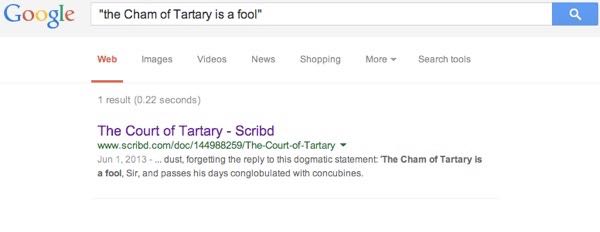
— — — —
parlor games
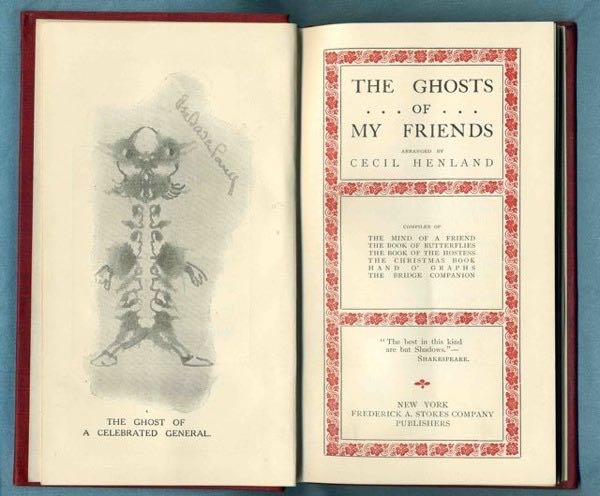
— The Ghosts of My Friends Arranged by Cecil Henland. Frederick A. Stokes, [n.d., printed by Dow & Lester in London ca. 1908].
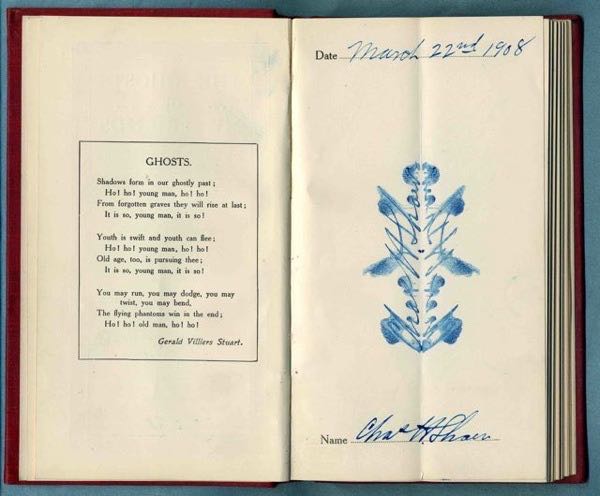
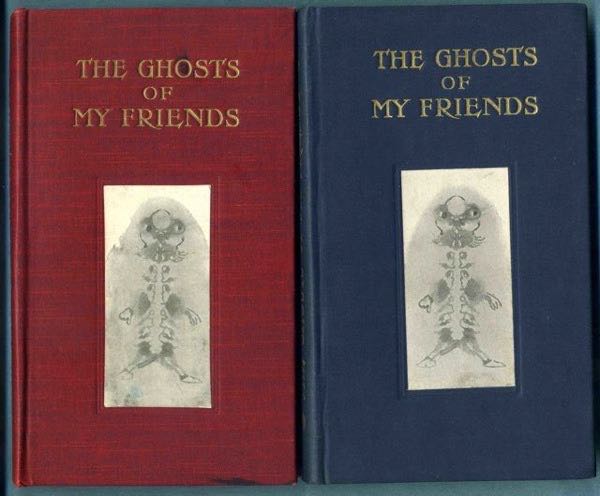
Two copies, one partly accomplished with signatures dated 1908 to 1918, the other blank. All ghosts now. Do you have a full pen of ink handy ?
— — — —
recent reading
— [J.J. Abrams & Doug Dorst. S.] [wrapper title]. Ship of Theseus by V.M. Straka. Winged Shoes, 1949 [i.e. : Little, Brown, 2013]. A playful, tricky simulation of an old book with a cover design after Lustig and layers of annotation.
— — — —
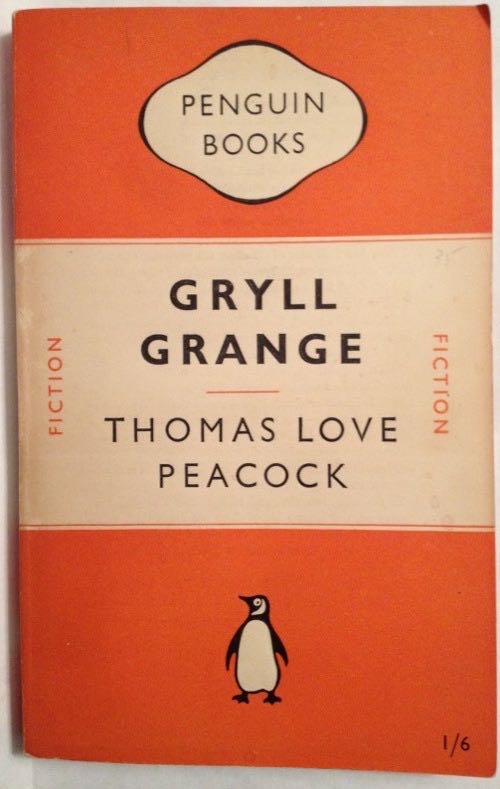
that hue : the average orange book
‘ I shall be glad to be cured of my unbecoming propensity to laugh whenever I hear of a lecturing lord ’
— Thomas Love Peacock. Gryll Grange (1861), in an orange Penguin paperback, 1949.
Peacock is pretty thoroughly grumpy about modernity, nonetheless his satire explodes the Whig fallacy of history and his female characters have great self-possession and good lines : “ You travel round the world by a hand-book, as you do round an exhibition-room by a catalogue. ”
— — — —
— James Bieri. Percy Bysshe Shelley. A Biography. Youth’s Unextinguished Fire, 1792-1816 [and:] Exile of Unfilfilled Renown, 1816-1822. University of Delaware Press, [2004]. Tracked to the source : clarification of Shelley’s vegetarianism and his relations with John Newton, author of The Return to Nature, 1811.
— — — —
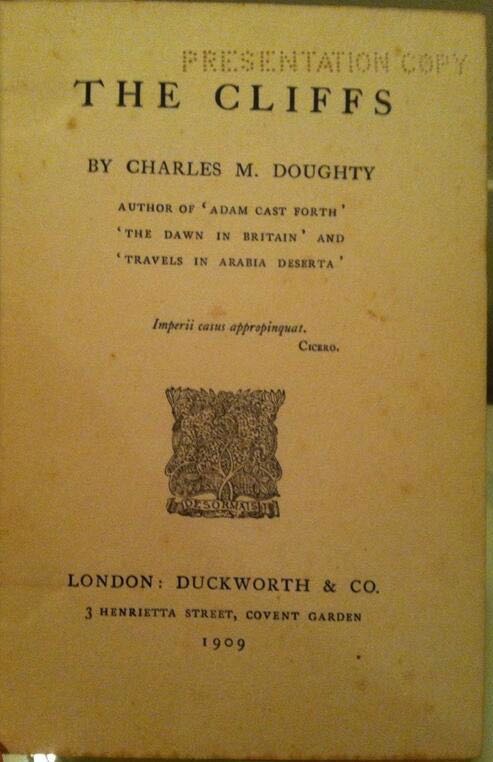
Language and more language, as without words we cannot think, without a knowledge of words we cannot, save confusedly, express our hearts.
— C.M. Doughty, cited by Herbert Davis in his Bergen Lecture, 1943
— C. M. Doughty. The Cliffs. Duckworth, 1909. Aerial invasion and elf-drama : conscription in the village, Oberon and a faery wedding, an English ghost army (with divine bowman !), and infant sacrifice ; the vicar militant, and war ! The richest, weirdest, crunchiest word-hoard your correspondent has seen in many years.
Hearken, whilst I call over our elf-mote.
Young Gam and Wern and Olp and Dru and Knop ;
Trippe, Ban and Bolt, and Clum and Pust and Tarpe
— Barker Fairley. Charles M. Doughty. A Critical Study. Jonathan Cape, [1927]. On Doughty’s profound study of languages, his long-term poetic aims, and “ the wealth of fuller knowledge not given ”. Doughty’s elf-lore was so thoroughly rooted in scholarship of Norse literature that “ even his airiest inventions are as true to tradition as if they were the tradition itself. ”
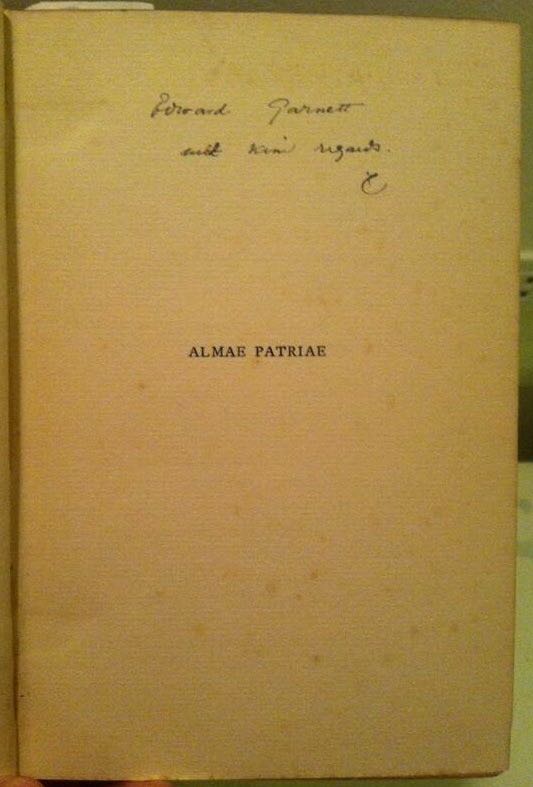
Dedication page of The Cliffs, inscribed to his editor, Edward Garnett. Photos courtesy of Dan Visel.
— — — —
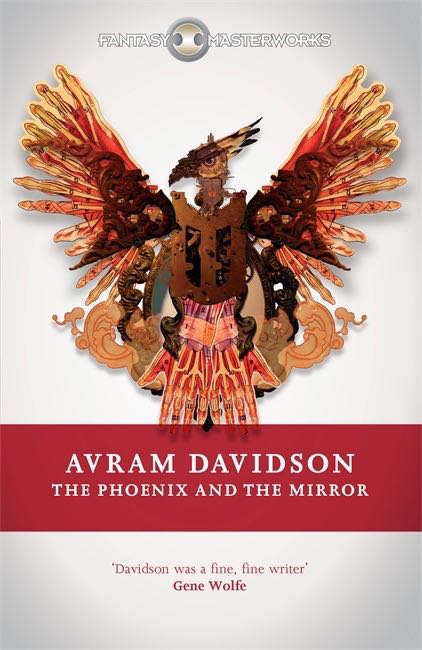
— Avram Davidson. The Phoenix and the Mirror [; or, The Enigmatic Speculum (1969)]. [Introduction by Adam Roberts]. [Gollancz, 2013]. Fantasy Masterworks
series.
Go read it : Joanna Russ did, http://avramdavidson.org/russ.html.
Read The Phoenix and the Mirror for the sentences, the
wild imagery, the episodic plot, the walk-on parts, the blossoming apple tree,
its color and erudition and its geography, and all the intricacies of the world
of Davidson’s Vergil. Adam Roberts read the book closely and the introduction is the fruit
of his reading, with some notable insights into the cadences of Davidson’s prose. When Vergil visits the eunuch Sylvian, Chief Priest of Cyprus, he employs “ the device called a pembert, of which only Vergil himself and one other had the
art ”. Davidson’s pembert, its tiny lens-lamp and tinier mirror and distortion of shadow fully as remarkable
as the speculum major or Big Mirror that is the principal matter of the novel, is summoned for use
and then dismissed, all in the space of a couple of pages. A lesser writer
might have written a ten-page infodump on “ the device ”. It was also a delight to
see Vergil wield his letters of state, a precursor of the Provót entrusted to Doctor EstzerhazyÊin “ The Crown Jewels of Jerusalem, or The Tell-Tale Head ”. Re-reading the book, its flaws (noted by Russ) are there, but they
are the visible knots in a handmade tapestry : to re-read The Phoenix and the Mirror (for the first time in nearly a decade) was sheer delight. (See below for the perils of re-reading
Chesterton.)
One brief aside : what is it with publishers and subtitles ? Doubleday, publishers of the original edition, had a policy against subtitles
in fiction and the Ace paperback restored it, sort of : under the author’s name. Davidson had a couple of subtitles for Vergil in Averno ; Doubleday printed neither. And yet how many publishers slap the helpful subtitle A Novel onto a title page ?
— George Pelecanos. The Double. A Novel. Little, Brown, [2013].
— Peter Crowther. Jewels in the Dust. Subterranean Press, 2013. Stories old and new : “ The Fairy Trap ”, etc.
— Steve Katz. Florry of Washington Heights. A Novel. Sun & Moon, [1987]. [re-reading].
— John Buchan. Castle Gay (1930) [re-reading : back in the land of Dickson McCunn and the Gorbals Die-hards].
— — — —

“ . . . that the world is both deterministic and overflowing with endless surprise ”
— Rudy Rucker. Turing & Burroughs. A Beatnik SF Novel. Transreal Books,
[2012]. History unwound : Alan Turing in Tangier and America . . .
— — — —
— Craig Graham. Phantom Pain. Poems. Vagabond Books, [2014]
[. . .]
each summer again
another spell
of invention
on the ragged edge
of nothing
— — — —

— Jules Verne. Around the World in Eighty Days. Translated by Geo. M. Towle. Phila. : Porter & Coates, [n.d.]. “ I will jump — mathematically ”.
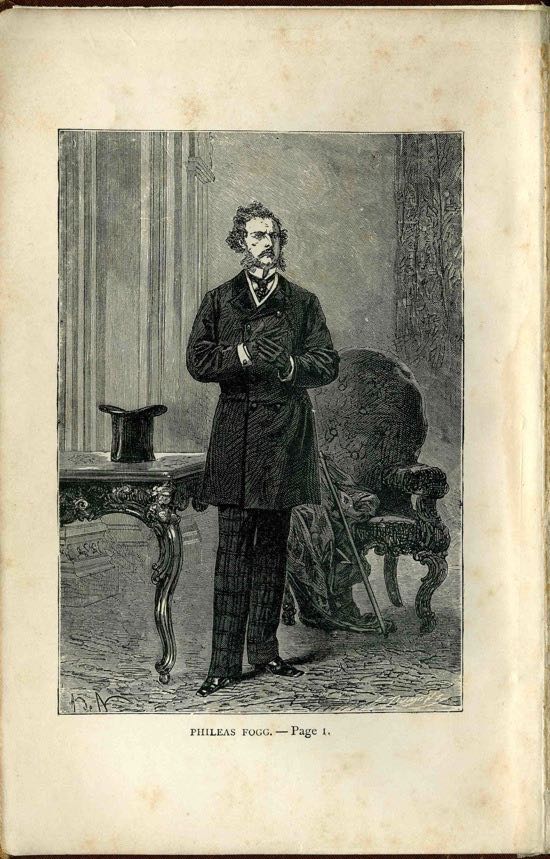
— — — —
— L. Sprague de Camp and Fletcher Pratt. Tales from Gavagan’s Bar (Expanded Edition). Owlswick, 1978. [re-reading]
— John Buchan. The Three Hostages, 1924 [re-read after an interval of perhaps 30 years, noting technique, conservatism of the narrative tone, observations of chaos].
— James Meek. The People’s Act of Love (2005). “ ‘ . . . a revolution happens when it happens in here. ’ [Samarin] tapped his head. ”
— Ian Donaldson. Ben Jonson. A Life. Oxford University Press, [2011.]
— Joseph Conrad. The Shadow-Line. A Confession [and:] Within the Tides. Tales [Works, vol. 16]. “ . . . the intimate delicacies of our relation to the dead and to the living, in their countless multitudes ”
— — — —
‘ Humphrey Pump had a talent for friendship and understood his old friend.’
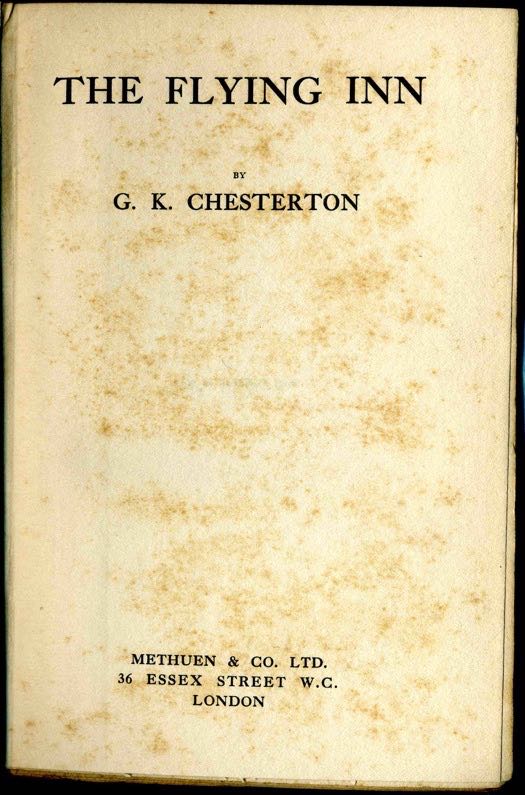
— G.K. Chesterton. The Flying Inn. Methuen, [1914]. Red cloth, titled in gilt. Name and pencil date, January 1914, on front flyleaf. Re-read on the occasion of the centenary of its publication. What a very long century since Chesterton wrote, “ For a peace was being given to Europe. ” Some thoughts on the novel follow.
The books one reads unquestioningly as a teenager warrant close scrutiny as an adult : Chesterton, Buchan, Tolkien. I think I have adequately interrogated the works of Lovecraft while observing the apotheosis that began with the first appearance of Joshi’s Life and the edition of stories presented by Joyce Carol Oates. I read Slan by A.E. van Vogt in French translation, at age 14, and that was the golden age ; I have quailed each time I have looked the opening paragraphs of English texts, and closed the book. I have so far resisted an embassy to Edgar Rice Burroughs, but I suspect that someday I will have a look at the Doc Savage reprints that I read as a child and teenager (there is a box in the attic). Tolkien I re-read aloud some years ago, and the steady walking pace of the prose epic was sufficient to make me marvel at the concision of certain deeply memorable passages, and at how Éowyn was the only woman in the book possessed of a character. But this is not about Tolkien, and I will get to Chesterton.
Earlier this year I re-read a book by Richard Usborne, Clubland Heroes. A nostalgic study of some recurrent characters in the romantic fiction of Dornford Yates, John Buchan and Sapper (second edition, Barrie & Jenkins, 1974). I never read Yates or Sapper, but there was lots of Buchan in the boarding school library and on other shelves. Usborne was a good skeptical re-reader of Buchan, noting the recurring principle of “ regenerative exhaustion [. . .] the honourable exhaustion of the spirit, curable only by honourable exhaustion, in the open air, of the body. ” Or this :
This type of man-of-the-world, know-it-all passage, clever trick that is effective if infrequently offered, occurs several times in Greenmantle and once or twice in each of Mr Standfast and The Three Hostages. On second readings and second thoughts you will probably agree that this style of thing is Buchan pulling high-quality wool over his readers’ eyes.
Usborne identified “ The Loathly Opposite ” in The Runagates Club as one of the earliest stories of radio intercepts and code-breaking, “ And here is John Buchan giving the gist of it in World War I and, as usual, taking the heat and hate out of it . . . ” Usborne was also pretty good at the laconic statement, “ On the other hand, is weather, however divinely glimpsed, the essential stuff of thrillers ? ” The Thirty-Nine Steps is a headlong race against time, and its narrator, Richard Hannay, is still an outsider to the corridors of power into which he blunders. By the time of The Three Hostages, Hannay is as thoroughly a member of the establishment as Buchan was, and the narrative tone has altered. In re-reading Castle Gay (1930), I could see Jaikie Galt being given the treatment, and it grated (Huntingtower and The House of the Four Winds retain their charms for me).
And so we come to The Flying Inn. Chesterton is a brilliant writer with a gift for a memorable turn of phrase : the quotation at the head of this essay is the source for one I have used for a decade, though it has been thirty years or more since I read the book *. The Flying Inn is kinetic, madcap Chesterton : Patrick Dalroy and Humphrey Pump are truly memorable characters, and Lord Ivywood’s Nietzschean downfall is deftly achieved. I remembered the humor and common sense of Dalroy and Pump, the main arc of the plot, and many of the core images : Chesterton is really good at crowd scenes. What I had utterly forgotten was a thread visible in an (almost) blameless first paragraph. Even more than Buchan, Chesterton’s off-hand, inner-circle narrative mode is a chummy, tainted ‘ we ’ inseparable from the book. This is a perfect exemplar of the magic of class. It is not the brilliant caricatures and The Flying Inn that are appalling : it is that the narration makes the reader complicit in an architecture of unquestioned privilege and received prejudice. Despite a zany plot, sometimes the experience of reading The Fying Inn is of swimming in a polluted river ; but, oh, the Songs of the Car Club ! and the dazzling sentences that are the river unpolluted. (See above for the delights of re-reading Avram Davidson.)
———
* Chesterton’s satirical coinage, Chrislam, persisted in memory :
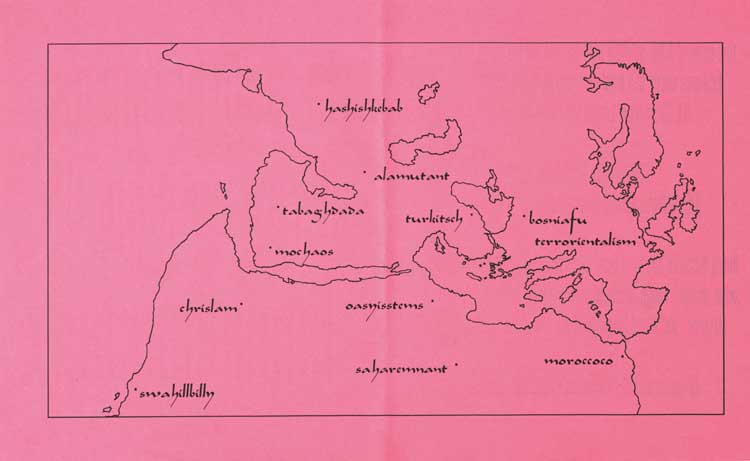
The Subtle Journal of Raw Coinage 86 (1995) : Islamdancing (map and words by Henry Wessells)
http://www.avramdavidson.org/subtle2.htm
— — — —
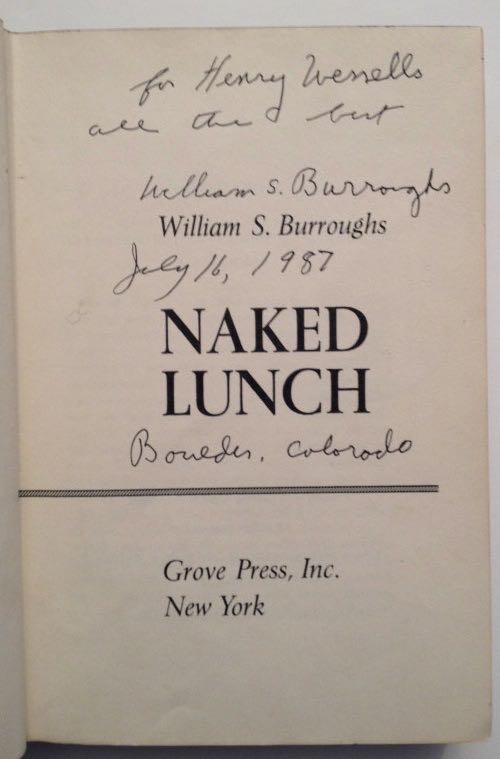
William S. Burroughs. Naked Lunch. [Tenth printing, lacking dust jacket, shelfworn, ex-library with marks. Inscribed.]
— — — —
Commonplace Book :
The purpose of writing is to make it happen.
— Wm. S. Burroughs. The Adding Machine
“ . . . it’s that I don’t necessarily have all the interim sentences. Those words are the two words I have”
— M.K. Wilmers
http://www.theguardian.com/books/2014/mar/09/london-review-books-lrb-best-magazines-world-mary-kay-wilmers
“It is like the flowing of a river : it is always different water, but you do not see the difference”
— Peacock, Gryll Grange
“Whenever I read this kind of thing, it tells me the writer is not sensitive to the full value of the idea of comparison”
— Lydia Davis
— — — —
The New York Antiquarian Book Fair
The New York Antiquarian Book Fair opens on Friday 4 April at the Park Avenue Armory (preview Thursday evening). Your correspondent will be in booth E1. Come say hello. Let me know if you would like a pass.
— — — —
before world war one ; and after
Science Fiction and Fantasy Writers in the Great War : http://fantastic-writers-and-the-great-war.com
A fascinating compendium of biographical information, edited
by Edward James. Have a look at the entry for Hugh Lofting, for example ; or Stella Benson.
mailbag roulette, late February

cats 5, dogs 2 ; horses 6, receding [and too much sugar . . .]
— — — —
— — — —
This creaking and constantly evolving website of the endless bookshelf : I expect that some entries will be brief, others will take the form of more elaborate essays, and eventually I will become adept at incorporating comments or interactivity. Right now you’ll have to send links to me, dear readers. [HWW]
electronym : wessells
at aol dot com
Copyright © 2007-2014
Henry
Wessells and individual contributors.
Produced by Temporary
Culture, P.O.B. 43072, Upper Montclair, NJ 07043 USA.